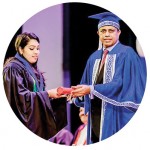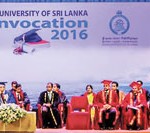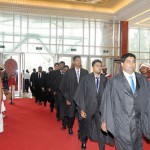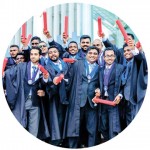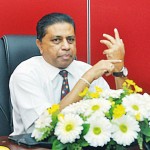Join with Ocean University to become an expert in Fisheries and Marine Science
View(s):Ocean University of Sri Lanka University is one of the well-recognised universities in Sri Lanka which is recognised by the Ministry of Higher Education. Opening doors to an ocean of knowledge and qualifications including the degree programmes, diplomas and certificate courses, the university have broadened the career opportunities in national and international job markets. Established by the Parliament Act No 31 in 2014, Ocean University serves to the objects of conducting academic and professional education, vocational training in fisheries, marine and nautical engineering, to fulfill and develop the needs of the fisheries and allied sector.
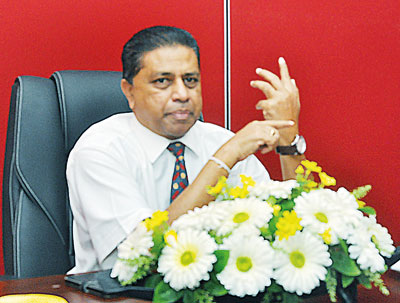
Mr Thilak S. Dharmarathna, the Vice-Chancellor of the Ocean University
Mr Thilak S. Dharmarathna, the Vice-Chancellor of the Ocean University joined with us for a discussion about the university and the upcoming events.
What was the purpose of starting a university specialised in Fisheries and Marine Science?
It is a well-known fact that Sri Lanka is an island surrounded by its own aquatic eco-system and offshore systems including mangroves, fishery and beaches. One of the main objectives of establishing Ocean University is to make use of the coastal areas and educating and preparing individuals for industries like the fishery and marine engineering while helping the industries to grow.
We were originally established under the Parliament Act of 1999 as the ‘National University of Fishery and Marine Engineering’ and in 2014 our university was re-established as ‘Sri Lanka Ocean University’. During the time there was no other educational university established that was specialised in teaching a curriculum related to fishery and marine sciences and our university was the first successful attempt of doing so.
Currently, the university has created the opportunity to get all the degree, diploma and certificate level qualifications related to fisheries and marine sciences for Sri Lankan students. At Ocean University, we equality focus on giving both theoretical and practical knowledge to our students and it is important to mention that we have a well-qualified staff of lecturers to support them.
Living in the coastal areas of Sri Lanka, we have generations of people whose livelihood is based on the sea. Even though now we are comfortable with modern technology, the early years of the industry were mostly based on environmental facts, for instance, depending on the nature of the sea and weather. But because of the lack of proper theoretical knowledge and skills, there were many instances where the coastal areas in Sri Lanka were at risk.
The original purpose of establishing this university was to properly educate people living in coastal areas about the opportunities of utilising the natural recourses around them while preserving the natural eco-system. Later our mission was to ‘provide state-of-the-art training and education to meet the current and emerging need in the Fisheries, Marine and Maritime Sectors’.
What are the vocational training courses offered by the University?
In Sri Lanka after A/L’s only a little percentage is selected to state universities. While a small amount of the remaining students look for private higher education universities, but the remaining of around 2 lakhs does not think of pursuing their dreams of higher education. As Ocean University, we try to motivate these students and educate them for a proper career in the industry of fishery and marine sciences.
- Mr Thilak S. Dharmarathna, the Vice-Chancellor of the Ocean University
At our university and through our provincial centres located island-wide, we offer internationally accredited vocational training qualifications. In Sri Lanka, we are not much aware of this National Vocational Qualification or NVQ. This vocational training qualification has seven levels from NVQ Level 1 to NVQ Level 7. For anyone who completes any NVQ level is given a National Certificate, certifying that he or she has completed the particular level. NVQ open doors for the school leaver or students after their O/L’s or A/L’s achieving their dreams of higher education and to get a degree.
At this university, we offer several Aquatic Resource Management courses including Engine Courses, Boat Production and Maintenance, Fishing Technology Certificate Course, Marine Welding Technology, Scuba Diving, Welding Under Water, Fishing Boat Navigation, Life Guards, Repairing Air Condition and Refrigerators, Map Reading and much more at NVQ 3/4 Levels. We also conduct diploma courses for Shipping and Logistics Management, Aquaculture and Aquatic Resource Management, Fishing Technology and for Marine Engineering. After completing these diplomas courses the student will be qualified with NVQ Level 5/6.
Apart from that we conduct several CDC courses including Pre Sea Training for Engine Rating and Pre Sea Training for Deck Rating courses and as for the request made by several village communities, unions and the Ministry of Fishery we offer few courses of Repairing Engine and Fishing Equipment, Maintenance of Fiberglass Boats First-Aid and few others outside the university as a mobile service.
In Sri Lanka, we are the only higher education university offering national vocational training qualifications in the field of marine sciences.
What are the other higher
diploma and degree courses
available at Ocean University?
In the field of marine sciences and coastal areas, we have less number of experts, managers, employees and resource people. In order to full fill this need of professionally qualified scholars, at Ocean University, we offer several Degrees. Currently, we are conducting only 04 courses including B.Sc in Marine Engineering, B.Sc in Fisheries & Marine Science, B.Sc in Maritime Transportation Management & Logistics and B.Sc in Integrated Coastal & Marine Resources. These courses are conducted in English and in future we all planning to implement a few other courses for interested students.
Approximately, we offer around 200 registrations for each course considering the A/L results of the candidate.
Finally, can you say a few words
about the second graduation
ceremony of the university?
We have planned to have our graduation ceremony at BMICH on the 12th of March this year. This is our second batch of graduate students and we are offering degrees for 109 scholars this year.
Thishana M. Rajanayake



